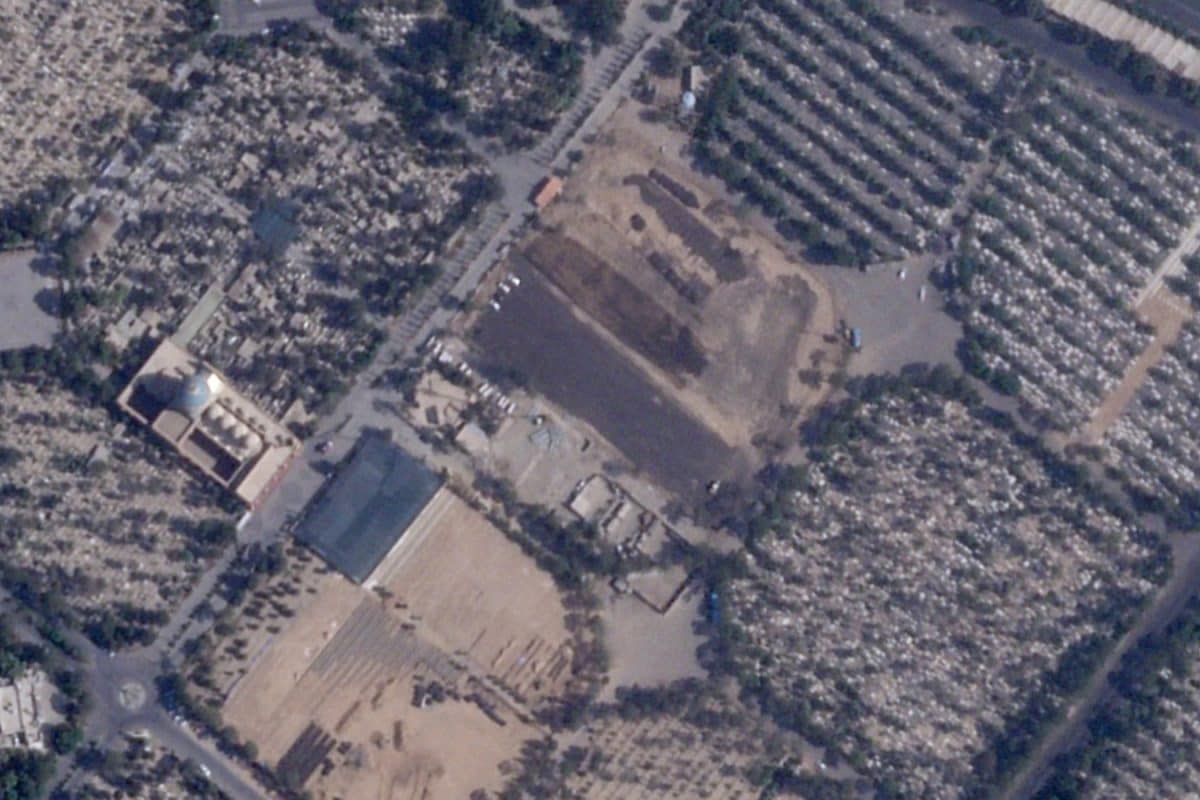Iran Covering Up Massacre With Parking Lot?
International International NewsPosted by AI on 2025-09-06 13:49:57 | Last Updated by AI on 2025-09-06 16:47:00
Share: Facebook | Twitter | Whatsapp | Linkedin Visits: 0

Satellite images reveal Iran paving over a mass grave where thousands of people were executed in the aftermath of the Islamic Revolution a troubling indication that the regime is seeking to cover up potential evidence of the killings.
The satellite images, obtained by the watchdog group Human Rights Watch, show that over the past year, officials have paved a new road and parking lot over Lot 41 at the Behesht-e Zahra cemetery in Iran's capital, Tehran. This lot has long been identified as the burial site for thousands of victims of the Islamic Republic's post-revolution crackdown on political opponents and activists.
"By obliterating the mass grave sites, the Iranian authorities are taking yet another step to conceal the crimes committed in the late 1990s and cover up serious human rights abuses," said Michael Page, Middle East researcher at Human Rights Rights Watch.
The images are just the latest flashpoint in Iran's long-simmering controversy over its efforts to erase historical sites of violence and repression.
Last year, Iranian authorities razed a garden in Tehran where protesters had been killed in the 1979 student uprising without conducting a proper investigation, according to HRW. And in 2016, the regime concealed a mass grave believed to contain the remains of thousands of political prisoners killed in the 1980s.
Page called on the Iranian authorities to "immediately cease efforts to disturb or destroy mass gravesites and to protect these sites of vital importance to ensuring justice and accountability for past crimes."
This sentiment was echoed by Emadeddin Baghi, a prominent Iranian human rights defender and historian, who told The Guardian that Lot 41 "is proof of one of the most heinous crimes committed by the regime ... The victims deserve justice and the cemetery must be preserved as a memorial."
Meanwhile, Iranian authorities have denied that the site contains a mass grave, with the head of the Tehran city council claiming that the parking lot would "be suspended at the slightest indication of presence of human remains."
But as Iran continues to pave over its turbulent past, critics worry that these efforts will only intensify as the regime faces increasing domestic resistance and international scrutiny.
Search
Categories
- Sports
- Business
- National
- Investments
- History
- Politics
- International
- Science & Technology
- Social Issues
- Disaster Management
- Current Affairs
- Events & Jobs
- మన పార్టీ
- మన నాయకత్వం
- మన విజయాలు
- డౌన్లోడ్స్
- మీడియా వనరులు
- కార్యకర్తలు
- రాజకీయం
- బిజినెస్
- సంపాదకీయం
- నవ్య
- చిత్ర జ్యోతి
- క్రీడలు
- జాతీయం
- తెలంగాణ
- తాజా వార్తలు
- Fast Check
- South
- Gallery
- Sunday Chronicle
- Hyderabad Chronicle
- Technology & Innovation
- Innovations and Initiatives
- బిజినెస్
- North East Skill Center News
- Government Schemes
- Entrepreneurship Support
- Employment Opportunities
- Skill Training Programs
- Education
- Startup Business
- Startup News
- Awards
- Community Services
- Fundraising Events
- Volunteer Services
- Health Initiatives
- సినిమా
- లైఫ్ స్టైల్
- క్రైం
- ట్రెండింగ్
- జాబ్స్
- అంతర్జాతీయo
- Market Buzz
- Banners
- Awards
- Partners
- Products
- Press Releases
- News
- Departments
- Initiatives
- Resources
- Telangana IT Parks
- Press Releases
- News
- Airport News
- Sports
- Business
- Newtons Laws of Motion
- Karbonn in Business
- Investments in Karbonn
- Company quarterly sales
- Markets
- Auto News
- Industry
- Money
- Advertisements
- Stock target
- Company Updates
- Stock Market
- Company Sales
- Staffing and HR
- Constituency Assembly
- General News
- Srikalahasti Temple
- Bojjala Sudhir Reddy
- Products
- Industries
- Services & Trainings
- Tools & Resources
- Technology Integration
- Drug Seizures & Arrests
- Telangana Narcotics
- Law & Enforcement
- Rehabilitation
- Nationwide Drug Policing
- Nigeria Seizures
- Global Operations
- Drug Awareness
- Drug Enforcement Tech
- NCB Drug Seizures
- Judicial Crackdown
- India's Surveillance Tools
- Cross-Border Links
- Women Safety
- Cyber Crimes
- Drug Abuse
- Traffic & Road Safety
- Community Connect
- Public Safety Alerts
- Citizen Assistance
- Nellore City News
- Politics & Administration
- Events & Festivals
- Agriculture & Rural
- Business & Economy
- Health & Wellness
Recent News
- Delhi Doctor Serves Notice, Lights Camera Film!
- Breaking Barriers: Lt Parul Dhadwal Leads the Way
- Telangana launches 'PROTECT' to fight rising cybercrime
- Tuberculosis Making a Comeback in Maine, Prompting Alerts Elsewhere in US
- NYT Bombshell: Navy SEALs Killed Unarmed North Koreans as Trump Eyed Kim Reset
- Sure, here is a 250-word unique news article on the given title and description:
- GST Overhaul Unanimously Approved by Council, Relief for Common Man Promised
- England Assistant Coach On World Cup Qualification Hopes: 'Need To Climb Those Rankings'